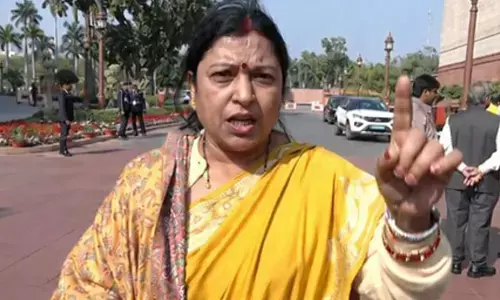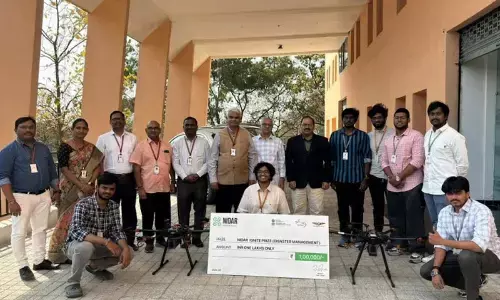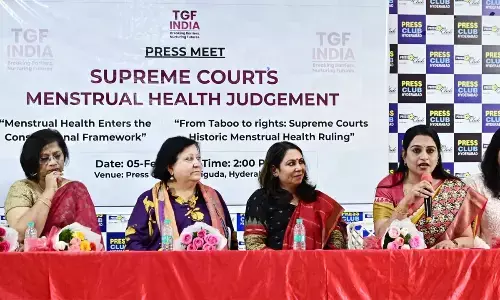MyVoice: Views of our readers 22nd October 2023

MyVoice: Views of our readers 2nd February 2026
In the 19th century, the romantic literature was strongly influenced by several reformistic movements that blew across the nation.
Woman in Telugu poetry
In the 19th century, the romantic literature was strongly influenced by several reformistic movements that blew across the nation. Raja Rammohan Roy who raised the banner of revolt the heinous practice of Sati became the source and strength of inspiration for such social reformers as Kandukuri who fulminated against child marriages and pleaded for widow remarriages. Besides, the Brahmo Samaj and the new concept of womanhood in the romantic poetry of England brought about radical changes in the very outlook of the new Telugu romantic poets. Woman, till then treated as a sensual creature, acquired a new dignity, nobility and purity in the hands of the new romantics.
The test of civilisation is said to be the estimate of woman. If one wishes to know the political, social and moral condition of a society, one must ask what rank women hold in it. A glimpse of the history of Telugu Literature shows the miserable life of an exploited woman in a male-dominated society of cussed customs and regressive measures.
The women characters as presented in the translated version of the Mahabharata are highly individualised. They are the very pictures of assertive moral courage fortitude and forbearance. For instance, in the Virat Parva, Draupadi mocks at Dhama Raja’s addiction to the game of dice and questions whether she being the wife of such an addict enjoys any reputation. Sakuntala in the Adi Parva warns Dushyanta of any ill treatment of wives and says that such a husband deserves no place either in this world or in heaven. The famous Trio Nannayya, Tikkanna and Errapragada have, however, shown their penchant for a male-dominated world in which a woman who followed and obeyed her husband is considered ideal and chaste.
The age of epics was followed by that of Kavyas. Renowned Sringara poets like Srinadha revelled in description of the physical beauty of women. A great devotee like Pothana also could not avoid describing sensual exploits of Lord Krishna. The Prabandha period did not lag behind its precursors in treating woman as enjoyable, purchasable commodity and depicting her bodily features and graces. The post Prabandha literary abounded in unbridled Sringara which often bordered on licentiousness. For instance, Prabandha poets such as Muddu Palani often characterised Lord Krishna more as one indulging in sensual exploits and depicted such characters as Radha as one fettered by the man-made customs and seeking a way-out of the tyrannical social milieu.
An enlightened critic like Gidugu Sri Rama Murty struck the nail on the head by terming such unchecked Sringara as ‘Kshudra Sahitya.’ An instance of the helpless bondage of a woman whose natural physical cravings are ignored by her hermitic husband and who dreams of and desiderates fulfilment with another man is in ‘Ahalya Sankrandanam’ written by Sanmukham Venkata Krishnappa Nayakudu. The ‘Satyabhama Swantanam’ of Linganamaku Tirukamayya shows the double standards of man and degrades women as mere animals devoid of knowledge. Anantha Matya in his ‘Bhojarajeeyam’ squarely blames man for the degradation of womanhood. What shocks the readers of the classics of this period is that even women writers like Rangajamma portrayed woman as ‘enjoyable’ creatures meant to quench the sexual thirst of man.
In the 19th century, the romantic literature was strongly influenced by several reformistic movements that blew across the nation. Raja Rammohan Roy who raised the banner of revolt the heinous practice of Sati became the source and strength of inspiration for such social reformers as Kandukuri who fulminated against child marriages and pleaded for widow remarriages. Besides, the Brahmo Samaj and the new concept of womanhood in the romantic poetry of England brought about radical changes in the very outlook of the new Telugu romantic poets. Woman, till then treated as a sensual creature, acquired a new dignity, nobility and purity in the hands of the new romantics.
In the beginning, the Telugu romantic poetry written between 1910 and 1940 was called ‘New Poetry.’ It later assumed the title ‘Bhava Kavitvam.’ The romantic poets, in their preoccupation with the physical charm, grace and beauty of women in their verses, distanced themselves from the blazing realities of life; They wove a beautiful world of imagination wherein one seldom came across the wailing voice of a woeful woman trodden under the heinous customs .But, unlike the Prabandha Poets who viewed women from sensual angle, they looked up to her as a veritable goddess of love.
It is said by critics that while the women in the verses of Prabandha Poets possessed only a body and no heart, she acquired only a heart but lost the body in the verses of romantic poets.
Despite the encomiums showered on women, it must be said that the romantic poets have not cared to take up cudgels against the feudalistic society in which child marriages, bride selling and child widowhood were shockingly perpetrated by the forces of obscurantism of the day. Barring very few poets like Gurajada, Mangipudi Venkata Sarma and Mutnuri Venkata Subbarayudu, no other romantic poet dared touch the burning problems of those days. Gurajada, in fact, was the first
to portray realistically the pathetic plight of woman in his ‘Purnamma.’ It is said that had the poets after Gurajada trodden his path, there would not have been any period of romantic poetry in Telugu literature.
Rayaprolu Subba Rao was the first poet to propound the concept of platonic love unstained by physical desires and cravings. His characters show an amazing self-control over pleasures and desires. They reckon beauty of soul as more valuable than beauty of body. They define Sringara as unsullied affection, undiluted attachment, unstained love and disinterested friendship. The heroines are verily the benevolent preceptors, friends and philosophers who preach the abiding values of life and eternal purity of love. It is said that in his new concept of woman, Rayaprolu was deeply influenced by the Saundarya Lahari of Adi Sankaracharya and the classics like Ramya Lokam and Madhuri Darsanam.
Despite their surgical analysis of society, the progressive poets and the Digambara poets have not succeeded in projecting the predicament of woman exclusively. It is also said that romantic literature viewed the place of woman in society against the background of the transition of society from a feudalistic stage to that of bourgeois. Barring a few prominent revolutionary poets like Gaddar and Siva Sankar, there have not been considerable number of poets committed to the redemption of woman. (Courtesy: Jayaprabha )
– S M Kompella, Kakinada
State polls will set the tone for 2024
The countdown of elections in five states for main political contenders that will be a precursor for the next general elections in the country is an unmissable aspect in the write-up by Ramu Sarma. There are several undercurrents which come into play in deciding winners in these states. The fight for Telangana is undoubtedly between the TRS and Congress that seems to have picked momentum in favour of Congress after Sonia Gandhi and other high profile national leaders visited Hyderabad recently. It is surely more loaded against BRS as compared to Congress, coupled with liquor gate involving K Kavitha that BRS is unable to shake off.
Rajasthan and Chhattisgarh Congress units are reeling under severe infighting and anti-incumbency factors that may prove advantageous to the BJP. Rajasthan became notorious for women molestations and murders that people of the state are quite fed up with, and want a change for good in this regard. The 33% women reservation about which the Congress has been vociferous in the Parliament did not result in the nomination of more women candidates in any of the five states. The BJP, on the other hand, has utilised this trend more effectively, even before the Bill becomes a reality to be a general trend nationally that the country will have to wait for several more years.
Madhya Pradesh is a major state that the BJP is making every effort to capture by ousting the Congress there. The solid and unmissable performance by BJP will be highlighted in the elections to five states that people are already aware of. India’s solid stand in favour of Israel in the Hamas-Israel war will have a sure advantage for BJP from the Christian voters in the country; while it might have antagonised the Muslim community that is not a supporter of the BJP in any case, will not make difference to the party. It will be interesting to watch the final electoral outcome in the five states that will be a precursor to the future course that the electorate will take in the run-up to the 2024 general elections in the country that people are seriously concerned about.
– S Lakshmi, Hyderabad
Elections for 5 states were announced recently and we expect a close finish when the results are out early December. It is autumn for voters and winter for the candidates. The voters must be cautious before voting. The electorate should realise before it is too late that their votes are most valuable. They are not seriously against Ambanis or Adanis. They hate their affinity towards ruling parties in the states and in the Centre. And rest assured, if by chance the so-called opposition comes to power at the centre, do you think that will affect the businessmen? No. The business will be the same for them. It matters little who rules the nation. It is time to apply caution before exercising the right to vote.
It is always prudent for voters to pick a party of their choice with majority as we are all fed up with coalition politics. Instead of supporting a cluster of parties and letting the administration go haywire in the pre-election scenario as witnessed in the past. We have witnessed instability of the state governments in MP, Rajasthan and of late in Maharashtra and in other states facing such ticklish situations. It is time to elect a majoritarian government and enjoy the fruits for your right to vote. False promises are to be ignored. The pandemics have given high hopes for a majority rule in the states and bring out the best for the people. Again don't bank on freebies and that is going to block the development of the state.
– C K Subramaniam, Mumbai
Deftly woven micro stories
Vijaya Koganti is a well-known poet, author and translator in Telugu and English. He has half a dozen of anthologies of short stories and poems to his credit, besides scores of critical writings. This is his latest anthology of 'Flash Fiction,' a term coined by author James Thomas in 1992. Many of the 30 short-short stories here are not more than two pages each in length, but they explore the full gamut of human emotions. The author uses social platforms and popular apps as the background for many of the stories, making them at once more modern and contemporary.
In the story, ‘Transfer,’ when the five-year-old daughter comes to her mother with a picture, pointing out her father with another woman, the mother in a subtle way tells the daughter that her father has deserted them and transferred his love to his colleague. In ‘Punjab Mechanic,’ we see an encounter between a Punjab car mechanic and a customer who happens to be the person that the mechanic has been for years on the lookout as the daughter of his owner eloped with him.
In the story,’Talli Baillelinaadhe,’ the author deftly juxtaposes the celebrations of Devi Navarathri festival with the hellish wrath of a lone and helpless woman on a fateful day. 'Change changes everything' is a beautiful slogan of a company. In the story, ‘Edi Maavuru,’ a person who visits a place after many years sees what change really is and how it touches our lives. ‘Kotha Tharam’ is yet another moving micro story that holds a mirror to relationships between parents and children these days. The story, ‘Aagani Paata’ depicts the endless owes of a widow banker who always puts on a bold front. Brawls between customers and hotel staff are very common. The story,'Patam,' is about a hotel staffer who exhibits lots of composure even when he runs into rude customers. Behind every smile there may not be joy and Haritha, a working woman in a super market, proves this point in the story, 'Artham Kani Navvu.’ The story, ‘Meeting,’ brings out a 'regular and routine' scene in a college especially in the last quarters of an academic year.
With this book, published in May 2023, Vijay becomes perhaps the first Telugu writer to use the 'Microfiction' format effectively and impressively. With his keen eye and perception, Vijay has successfully woven a tapestry of life in this book which makes a compulsive read.
– M Somasekhar Prasad, Hyderabad
Turncoats must be dealt with severely
Whither anti-defection law today? After enjoying power and pelf for years in a particular party, suddenly embracing a new progressive party if ticket is not offered for contesting in the elections is not in good faith. Is it not beating the chest after squeezing the entire milk from the mother party? Where is loyalty? Resurrect the so-called anti-defection law from its muteness with strict conditions to be controlled by Election Commissioner only but not under the choice of Speaker of the House as it is the practice these days. CEC's active role comes into action only during election time and thereafter this institution goes into hybernation.
Once elected from a party, the candidate(s) should resign to the post if they are desirous of joining another party. This should be strictly applicable to independents too. Changing parties is tantamount to cheating the public who have voted them to Assemblies/Parliament. The salaries of those turncoats received during the time of their term must be coughed up to the government. Their profession is service orientation but not employment as per eligibility test and hence their perks and wages should be cut to one-fourth. However, they are provided with a lot of privileges like free accommodation, medical benefits, phone bills, transportation, foreign trips etc., at the expense of public money. Lower and middle classes are becoming poorer while political leaders are getting richer and richer.
All points penned in the poll manifesto must be implemented in letter and spirit by the party which forms the government either independently or through hung unless extraordinary circumstances create any obstacles. People should be vested with the right of recalling their legislators if they fail to rise to the expected lines of their jurisdictional areas.
– Dr NSR Murthy, Secunderabad
Agri distress needs structural solutions
Apropos, "Cabinet approves up to 9% hike in MSP of wheat," (THI, Oct 19). The election season has riveted the attention of political parties on the farming community. Parties are trying to outdo one another in offering sops to farmers. The BJP-led Union government has announced its largest-ever increase in the minimum support price of wheat. It is also giving a cash transfer of Rs 6,000 to landholding farming families under the Pradhan Mantri Kisan Samman Nidhi. These schemes underline the agricultural distress prevailing across rural India.
About half of India’s population is engaged in agriculture. This part is facing severe hardship due to higher input costs, climate change, lower prices and, above all, lack of long-term solutions to their recurring problems. Governments have resorted to knee-jerk reactions. Political parties focus on temporary reliefs rather than structural issues.
India needs to create a competitive and sustainable farm sector for achieving food security and improving rural incomes. It is among the largest producers of milk, pulses, spices, wheat, rice, cotton, sugarcane, fish, fruits, vegetables, tea, and some meats. To be a part of the global supply chain, it needs to create storage systems. Recurring scenes of farmers dumping their produce on the streets are symptomatic of policy failure. The government needs to guard farmers against the vagaries of climate and price through longer-term policy interventions.
– N Sadhasiva Reddy, Bengaluru
Let waste recycling begin at home
The effort to make the country clean, spick and span becomes a duty and necessity as dumping of waste at inappropriate places other than assigned dustbins and no timely lifting of wasteful garbage civic bodies is precipitating the situation. Across foreign countries, waste generated is disposed of as soon as it gets generated and dumped. As such, heaps of waste are not visible there. This isn’t so in India. To take Gandhiji’s call and Modiji’s appeal forward, it becomes necessary that the entire process of generation, disposal, dumping and treatment of waste as well as its conversion into wealth becomes perhaps an exercise in every home. Creative methods and ways to convert reusable waste into products of day-to-day use has been encouraged by Modiji through his many monthly broadcasts of ‘Mann Ki Baat.’ There are many examples for this. Had Gandhi been alive today he would have marvelled at this creative thought and praised Modiji and the many citizens who have taken to this practice on a mission mode. As not everybody is blessed with skills of creativity, one can at least contribute his or her small mite by willingly and wholeheartedly joining the movement for cleaning our nearby mohallahs, streets and our immediate neighborhood. This in itself if done with a sense of duty and dedication will help clean up India and make us all satisfied and proud.
– N R Raghuram, Hyderabad
Need for a socialist movement in India
Ref: "COUNTDOWN is on, yet all key contenders saddled with issues" (THI, Oct 21). The writer V Ramu Sharma has correctly analysed that despite looming decline of all political parties for various reasons, every party in the fray only appears to be groping in the dark without a clear strategy for the progress of their respective states.
Even as this is the saddest feature engulfing the present poll scenario, still every party coming out with a road map to woo voters without a strong sense of social commitment tells the tale that after having literally failed to fulfil the basic needs of common man for decades, the whole talk of rendering justice seems only farce. This being so and what it is clearly evident is that credibility of every party among the electorates is on the wane due to non-performance and corruption; still, every party is ready to go the extra mile to woo voters by coming out with guarantees. It is nothing short of party leaders living in a fool's paradise. Ostensibly, when politics in our country are still personality and family-oriented, even decentralisation of power has not helped in any manner to uplift the poor and downtrodden on account of caste playing a dominant role at every stage of operations due to dishonest political leadership.
It is clearly visible that politics in our country is full of dirt and the malady increasing at an alarming rate can never be erased unless a strong socialist movement takes birth to weed out present-day disruptive tactics played out by politicians besieged with issues of their own, making which is not only disappointing but also a blot on democracy.
– K R Srinivasan, Secunderabad














